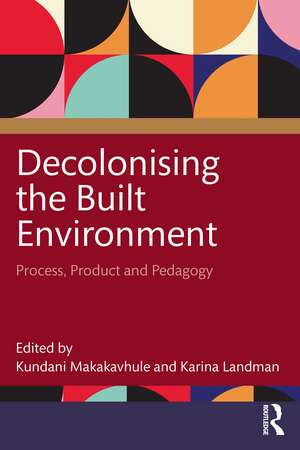Decolonising the Built Environment: Process, Product and Pedagogy
Editat de Kundani Makakavhule, Karina Landmanen Limba Engleză Paperback – 4 feb 2025
Essential reading for students, teachers, and practitioners, this book presents the project of decolonisation as a pedagogy and an ongoing process.
| Toate formatele și edițiile | Preț | Express |
|---|---|---|
| Paperback (1) | 310.37 lei 3-5 săpt. | +18.86 lei 5-11 zile |
| Taylor & Francis – 4 feb 2025 | 310.37 lei 3-5 săpt. | +18.86 lei 5-11 zile |
| Hardback (1) | 1056.95 lei 6-8 săpt. | |
| Taylor & Francis – 4 feb 2025 | 1056.95 lei 6-8 săpt. |
Preț: 310.37 lei
Nou
Puncte Express: 466
Preț estimativ în valută:
59.40€ • 61.78$ • 49.04£
59.40€ • 61.78$ • 49.04£
Carte disponibilă
Livrare economică 24 martie-07 aprilie
Livrare express 08-14 martie pentru 28.85 lei
Preluare comenzi: 021 569.72.76
Specificații
ISBN-13: 9781032352442
ISBN-10: 1032352442
Pagini: 262
Ilustrații: 70
Dimensiuni: 152 x 229 x 17 mm
Greutate: 0.35 kg
Ediția:1
Editura: Taylor & Francis
Colecția Routledge
Locul publicării:Oxford, United Kingdom
ISBN-10: 1032352442
Pagini: 262
Ilustrații: 70
Dimensiuni: 152 x 229 x 17 mm
Greutate: 0.35 kg
Ediția:1
Editura: Taylor & Francis
Colecția Routledge
Locul publicării:Oxford, United Kingdom
Public țintă
Postgraduate, Professional, and Undergraduate AdvancedCuprins
1. Towards a Decolonial Turn in the Built Environment Part One: From Paradigm to Process 2. Performing Space: Thoughts on Colonising, Decolonising and the Concert Hall 3. Settler Colonial Critique and Indigenous Urbanization 4. Place-Based Indigenous Knowledge Systems and Their Relevance to the Decolonisation of Urban Planning Practice in Namibia: The Example of the Olupale and Omuvanda Cultural Open Spaces 5. Place-Based Strategies to Transform South African Urban Nearby Nature Places 6. An African Landscape Design Approach for Rural Development Part Two: From Process to Product & Pedagogy 7. Decolonising the Built Environment in and around a University Campus: The Incongruence between Intellectual Discourse and Lived (Institutional) Practices 8. Visual Redress at Stellenbosch University: Staff Reactions to the Decolonisation of Campus Spaces 9. The Invisible Users of the Street 10: Ubuntu Design Aesthetics and the Built Environment in South Africa 11. An Inquiry into Visual Art as Critical Disruptor to Reveal Emergent Narratives and Authorship in Architecture 12. Kamĩrĩĩthũ: An Architecture for Decolonisation Part Three: Reflections on the Decolonial Turn in the Built Environment 13. Spaces of Erasure 14. Can the Master Speak? 15. Conclusion: Reconsidering the Decolonisation of the Built Environment
Notă biografică
Kundani Makakavhule is a Senior Lecturer in the Department of Town and Regional Planning at the University of Pretoria. Her current research is focused on the production, policy, and transformation of urban public open spaces as well as the transformation and regenerative potential of space on the neighbourhood and precinct scale.
Karina Landman is a Professor in City Planning at the University of Pretoria, with a background in urban design and srchitecture. Her work focuses on spatial transformation, including research on gated communities and safer and sustainable neighbourhoods, regenerative and resilient cities, and public space.
Karina Landman is a Professor in City Planning at the University of Pretoria, with a background in urban design and srchitecture. Her work focuses on spatial transformation, including research on gated communities and safer and sustainable neighbourhoods, regenerative and resilient cities, and public space.
Descriere
This book provides an important and much-needed comprehensive overview of how decolonisation is shaping the built environment in theory, practice, and as a process/project today. Part one studies decolonisation conceptually; part two studies decolonisation as a process; and part three studies the products of decolonisation.
